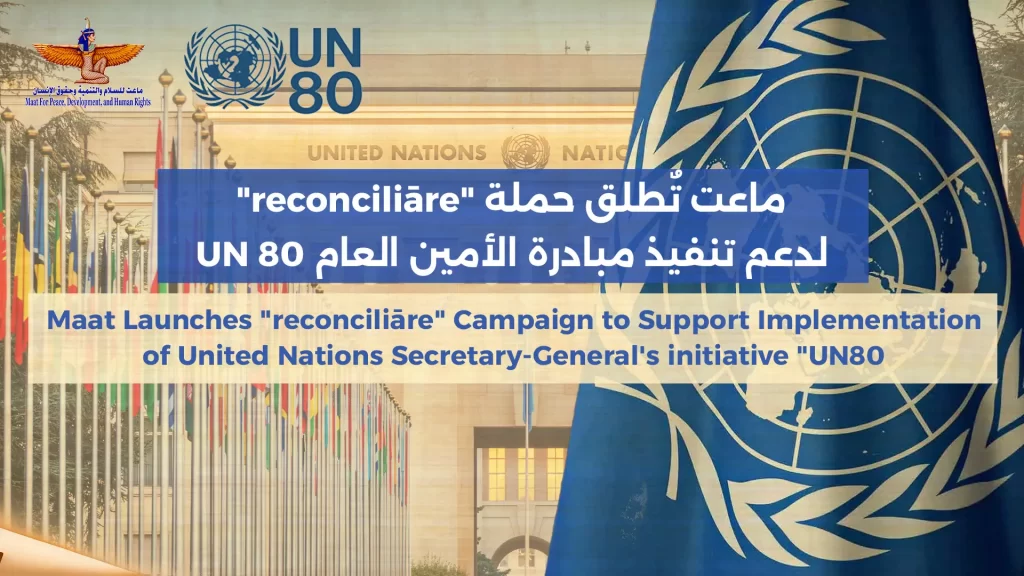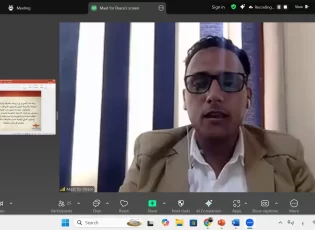In the context of its keenness to pursue and keep abreast of events, and in light of the requirements of the situation and its escalation, the last of which was the fierce attack on Islam and the Messenger, "may God bless him and grant him peace," which came against the background of the publication of offensive cartoons in Danish newspapers, which were subsequently published in a number of international newspapers, the Forum Maat discussed The issue of contempt of religions, their history and backgrounds, and ways and mechanisms to confront them by political parties and civil society organizations, especially during a seminar entitled “The role of parties and civil society organizations in facing the contempt of religions”.
Counselor Ahmed Al-Fadali, Vice President of the Federal Union for Peace in the Middle East, Mr. Waheed Al-Aqsa, Chairman of the Egyptian Arab Socialist Party, Dr. Ibrahim Turk, Chairman of the Democratic Unionist Party, and Mr. Mahmoud Mortada, Director of the Center for Development Studies Al-Badla spoke about the seminar. The seminar was moderated by Khalil Al-Awami. The Journalist in the Renaissance of Egypt.
At the beginning, Professor Ayman Aqil, “Director of Maat Center”, was keen to find out the reality of the situation, especially at the present moment and the Israeli contempt for religions. His latest episode was evident in an Israeli company issuing a postage that insults the preacher in Islam and is depicted as a singer, while the worshipers sit on chairs listening to him and having fun, Pointing out that it was part of the series of Israeli contempt directed at Islam, in addition to issuing a greeting card bearing the same method of insult, and referring to the move made by the opposition MP, Talaat Sadat, when he submitted an interpellation demanding the apology of the Israeli ambassador to the Egyptian Foreign Ministry, who moved the council in effect Submitting a memorandum to the Foreign Ministry, which summoned the Israeli ambassador to apologize.
Aqeel emphasized the media blackout that the state is practicing on such insults, calling on all active forces in Egyptian society to move towards finding a real role and an actual exit from the crisis with the need to activate the means of confrontation.
Wahid al-Aqsa, head of the Arab Socialist Egypt Party, emphasized his party’s rejection of the apparent contempt that worsens the relations of the two parts of the Egyptian equation and increases sectarian tensions, stressing that the parties ’role during this period is characterized by impotence and inability to move as a result of the ongoing prosecutions and blockades, and even the regime’s bombing of the parties And the imposition of a kind of security cordon attached to it in all its movements, which contributed to confirming this state of paralysis and its inability to coexist with the masses.
Counselor “Ahmed Al-Fadali, Vice President of the Federal Union for Peace in the Middle East and Chairman of the Democratic Peace Party, referred to his experience in trying to enact a law to criminalize contempt.
Religions, which was presented to the Secretary-General of the United Nations, “Kofi Annan,” stressing the importance of the partisan role in the next phase in facing issues that haunt societies, in addition to the need for the media to adopt the parties ’problems and not to mix up papers and publish false news about them, with the need to stop The hand of politicization from the media.
Al-Fadali referred to the case of the Egyptian parties, which suffer actual death and the inability to reach the masses in light of the security pursuit, who was trying to belong to a political party.
Al-Fadali stressed that the draft resolution presented to Mr. Kofi Annan is considered one of the unique experiences that deserve to be noted and praised by the media and shed light on it and pushed it to the field of activation and come out in the form of a binding law for the member states of the international organization.
On the other hand, “Dr. Ibrahim Turk, head of the Democratic Unionist Party,” went to the necessity of activating the role of the parties in confronting illegal forces, referring to the Muslim Brotherhood, which has 88 seats in the People's Assembly, which is treated as not prohibited.
He added that the real reason behind all the sectarian tensions and tensions that occur in Egypt from time to time is the existence of this group that contributed to dwarfing the role of political parties by wearing the mantle of Islam and attracting young people in mosques and hospitals, while legitimate parties are unable to obtain a hospital license.
“Mahmoud Mortada,” Director of the Center for Alternative Development Studies, went on to say that the issue requires an international campaign to combat contempt of religions, pointing out that the cartoons offensive to the Messenger and published by the Danish “Boland Boston” were the ones that exploded the situation and called for a law to criminalize contempt for religions.
He demanded that civil society be the spearhead in the face of contempt of religions, and affirmed that the International Covenant on Civil and Political Rights affirmed freedom of expression, thought, conscience, and religion, and freedom to embrace religions and hold rituals. But it is permissible to place restrictions on this freedom, so the law prohibits any advocacy of hatred, racism, or violence, and constitutes incitement to hostility or violence, and if the United States of America imposes two standards with regard to human rights issues, but we also apply two standards, and there are many books that deal with religions on the sidewalks.
The symposium witnessed several interventions regarding the mechanism of activating the party presence and playing an active role in keeping up with the events, in addition to the problem of building and restoring churches, confiscating freedom of thought and creativity, the issue of politicizing the media in the Egyptian reality and the need for a unified law for places of worship, and other problems that were raised on the dialogue table.
shortlink: https://maatpeace.org/en/?p=31378










